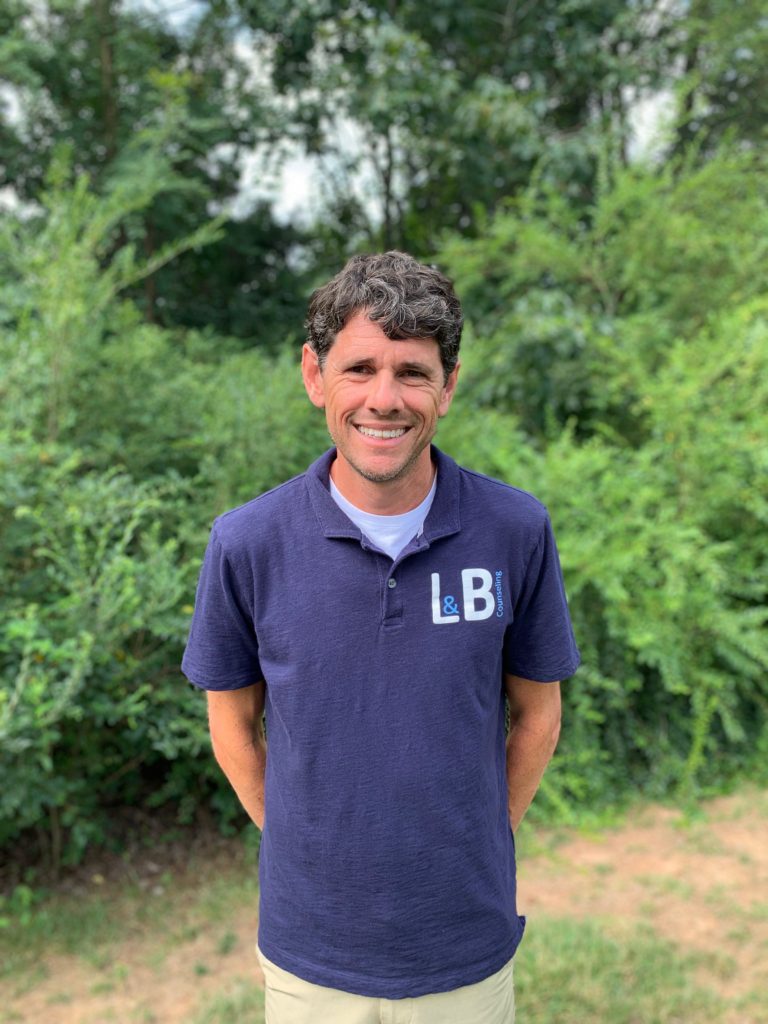
We would like to introduce you to the owner of L & B Counseling, Trent Morrow. You might have seen him in the office, on our webpage, or as of recently on our social media pages. For some of you, he might have been, or is your therapist, or your child’s therapist. So we thought, we would start with introducing Trent to you, and allow you to get to know him better.
How do you juggle the executive/business portion of running a practice while remaining clinically driven/being a therapist?
It has been a big challenge wearing all of the hats. Luckily over the past few years, I have been able to give some of those hats to my great team. I have learned over the almost ten years that I did not know very much on the executive/business side. They do not teach you anything in any class I ever had in high school, undergrad or graduate school about finance, accounting, marketing or the other key functions that must be in place to run a business. I have had a great family and friends as supports throughout the development of L & B Counseling. I continue to learn each day about how to run a good business and balance that as a therapist. My best practice is scheduling time in my calendar to read or work on the business, because the rest will be filled up by clients. I still love to learn about all the ways our brain is impacted by technology and how we can intervene as therapists to make our clients and their family’s more aware of the impact. I particularly love working with anxiety since we have a great system that allows the person to fight back rather retreat. It is really cool to see the progress they can make using their own strengths.
Can you share what it was like to start your own practice and what led you to that decision?
The decision to start my own practice was in a way made for me. In 2010, I worked for one of the major health providers in the county doing outpatient therapy with children and adolescents. They decided to eliminate the program to save cost in part to the recession. At the time the program served over 1500 children. Since there was not a noncompete in place since they eliminated the program our clients had the opportunity to continue services with me. This made the transition a little less scary since I technically started out with a caseload. I am an optimist to a fault so even though I did not know what I was doing, I had three other colleagues at the time to lean on, and learn from since we were all going through it together. I made a lot of costly mistakes but continued to learn and craft what we have today.
How do you not become your family and friends therapist?
I think anyone in this profession has a giving heart so you are always going to want to help. I think the transition between the two are easier at this point because the boundaries have been set up for so long now. You just have to know where the line is and certainly not step into something if you are not asked. I am happy to always find a referral for friends or family if they need someone to talk to professionally.
How does being a therapist impact your personal life?
I’m not sure that it does at this point. I think there are lot of jobs that are stressful and hard to imagine doing, but it is not for those people because that is their unique ability. I think when I was younger, particularly when I was working with aggressive youth it was draining. It is one thing that lead me to wanting to get my masters because I loved the job but knew it was not something that I could do long-term due to the acuity.
What is a challenge you’ve overcome?
I could probably answer that question differently everyday. There are always things to learn that I did not know existed or new ways of doing things. I think over the past year we have implemented an entrepreneurial operating system that has given us structure and ways to develop processes that allow for collaboration between the whole team. It has been cool to see the team take on different leadership positions and bring ideas to life. The system allows for a rhythm to development within the team weekly, monthly, quarterly, and yearly. We just got through our first year and have added to the system by incorporating a marketing system using the same philosophy.
What is your favorite form of self-care and why?
I would say that I do not have just one. It ranges from hanging out with the family, shooting basketball, playing a board game, weekend get away, date night with my wife, going to a concert, chilling on the couch watching a show, reading, doing goal development, small business development, running, training for races, or just being outside. Probably my top three are going to a concert with my wife, snowboarding out west, or running a race with my buddies.
How did you know you wanted to be in this profession?
I do not think I did until later in life. I grew up wanting to be a ski bum and that is what I set out to do. I was lucky and pulled it off living in Aspen for two years after college teaching three to six-year-olds how to make good turns. It was not till then that I realized that this was not a long-term plan and figured out I would go back to graduate school. I started in counseling and then switched to social work because it fit me better. Working at a day treatment facility taught me that I wanted to have more of an impact as a therapist, and having a masters in social work would give me flexibility in the job market. I love helping people, it just took me a minute to figure out how I was going to do that. Now I cannot imagine doing anything else.
How do you balance your professional and your personal life?
The age-old therapist question. Honestly as a business owner it depends on the day what that balance looks like. Sometimes I have had to grind because of what was needed. Sometimes I had to wear all of the hats of the business, so balance was bad. Work/life balance is a fluid thing and I do not feel that it has been clearly defined. I tend to think of things as buckets with 56 hours in each of the three buckets. The buckets equate to sleep, free time, and work. So if at the end of the week your buckets are close to even, then it was a good week. Sometimes in life you might have to work more than 56 hours but if you are aware of that choice, then you can get back in line so you do not start creating bad habits. It also makes my life easier since my wife joined the business last year. I get to see her a lot more because she helps keep me grounded and leveled.




